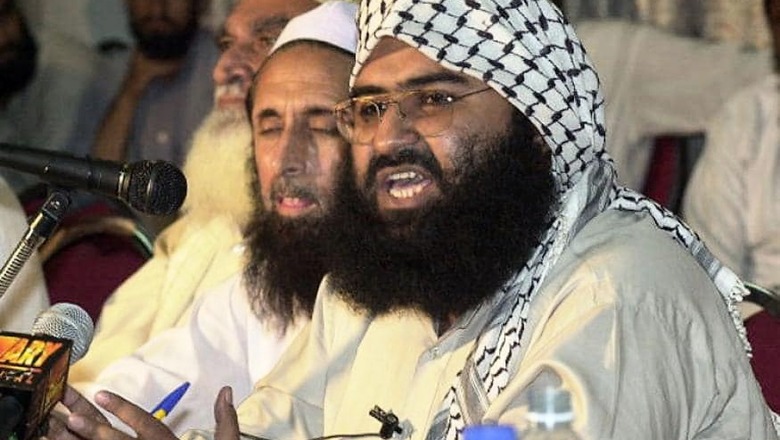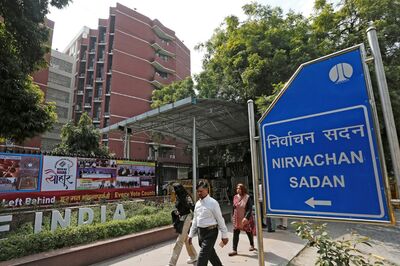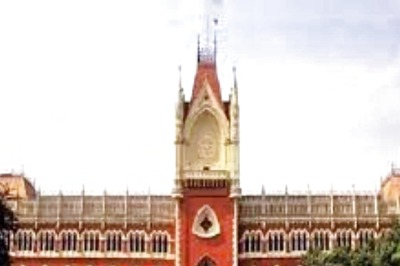
views
Islamabad: Jaish-e-Mohammed chief Masood Azhar's son and brother were among 44 members of the banned militant outfits arrested by authorities in Pakistan on Tuesday, amid mounting pressure from the global community on Islamabad to rein in terror groups operating on its soil.
"We have taken 44 people in custody as part of crackdown on militant groups," Minister of State for Interior Shehryar Khan Afridi said at a press conference here. Ministry of Interior Secretary Azam Suleman Khan said Hammad Azhar and Mufti Abdur Rauf were among those arrested on Tuesday. Hammad is the son of Masood Azhar while Rauf is his brother.
Khan said a dossier shared by India with Pakistan last week on the Jaish-e-Mohammed role in the Pulwama terror attack also contained names of Rauf and Hammad. "It does not mean that action is being taken against only those individuals who are mentioned in the dossier," he added.
The crackdown came amid tensions with India following the suicide attack that killed 40 CRPF soldiers and the IAF strikes on a Jaish camp in Balakot.
Indian security agencies, however, were unmoved by the supposed crackdown, with officials saying the terrorists were not arrested under the anti-terrorism laws but have only been taken in "preventive detention for investigation".
Similar actions by the neighbouring country against leaders of the proscribed outfits in the past turned out to be farce as those who were taken into custody were let off soon on different pretexts.
There is every possibility that the detention could also be an attempt by the Pakistan Army to provide security to these terrorists, given the "fear psychosis" that has gripped Pakistan in the past few days following the Indian Air Force strike at Balakot, an official said.
The assessment of the security agencies came in view of the fact that founders of Jaish-e-Mohammad and Lashkar-e-Taiba -- Masood Azhar and Hafiz Saeed respectively - were detained several times in the past, mostly under laws that provide for detention for apprehension of "breach of peace".
Azhar and Saeed have never been prosecuted under the Pakistan's Anti Terrorism Act, 1997, another official said.
India last week handed over the dossier to Pakistan to take action against the JeM, as pressure mounted on Islamabad to take action against individual and organisation listed by the UN Security Council as terrorists.
Foreign Minister Shah Mehmood Qureshi last week admitted that the JeM chief is in Pakistan and is "very unwell", but said the government can act against him only if India presents "solid" and "inalienable" evidence that can stand in a court of law.
Afridi, however, said the action was not taken due to any pressure. "This is our own initiative...We won't allow the use of our soil against any country," he said.
Interior Secretary Khan said the action would be taken against all the proscribed organisations under the National Action Plan, which was formulated after an attack on an army school in Peshawar in 2014 that killed nearly 150 people, mostly children. "This is across the board - we don't want to give the impression that we are against one organisation," he said.
He said the crackdown will continue for two weeks and actions against the arrested members will be taken on the basis of evidence.
Responding to a question, Khan said Hafiz Saeed-led Jamaat-ud-Dawa and its charity wing Falah-e-Insaniat Foundation would be banned within 24 hours.
On February 21, Pakistan government had announced that it had banned the JuD and FIF. However, according to the website of the National Counter Terrorism Authority (NCTA), which was updated on Monday, JuD and FIF are still under watch list.
Meanwhile, the interior ministry said in a statement that a high-level meeting was held on March 4 to implement National Action Plan (NAP). The ministry also said that actions against extremists will continue, as per the decisions taken in National Security Committee (NSC).
The move came a day after Pakistan on Monday promulgated a law to streamline the procedure for the implementation of the UN sanctions against individuals and organisations.
Interpreting the order, Foreign Office spokesperson Mohammad Faisal said the order means that the government has taken over the control of assets and properties of all banned outfits operating in the country.
The US last month asked Pakistan to "freeze without delay" the funds and other financial assets of the UNSC-designated terrorist networks and their leaders.
Pakistan is also under pressure from the Paris-based Financial Action Task Force (FATF) to deliver on its commitments to curb terror financing.
The FATF in June last year placed Pakistan onto its watch list in a bid to push the country to halt support for militant groups.
In June 2018, Pakistan made a high-level political commitment to work with the FATF and APG to strengthen its Anti-Money Laundering/Combating the Financing of Terrorism AML/CFT regime and to address its strategic counter-terrorism financing-related deficiencies by implementing a 10-point action plan to accomplish these objectives.
The successful implementation of the action plan and its physical verification by the APG will lead the FATF to clear Pakistan out of its grey list or else move into the black list by September 2019.




















Comments
0 comment